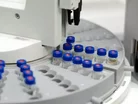New microcontrollers released from STMicroelectronics

Written by Carol Brown
STMicroelectronics has extended its STM32 L1 series of ultra-low-power ARM® Cortex®-M3 32-bit microcontrollers with new 512KB flash devices. The L1 series now includes more than 70 part numbers in three lines that offer the market-unique combination of ultra-low power consumption and memory size up to 512KB of Flash and 80KB of RAM.
Offering outstanding low-power operation via ST’s new, proprietary ultra-low-leakage 110nm CMOS process and optimized architecture, the new devices target cost-efficient embedded designs in connected and battery-operated applications in fitness, healthcare, wearable, and industrial/metering domains.
Key features of the L1 series include:
• High-performance ARM Cortex-M3 32-bit core: up to 33 DMIPS operating at 32MHz;
• Pin-to-pin and software compatibility with all previous STM32 L1 devices;
• Run-mode dynamic power consumption 257µA/MHz at 32MHz down to 177µA/MHz @ 4MHz
• Two ultra-low-power modes: down to 435nA with SRAM retention;
• True embedded EEPROM;
• Dual-bank flash allowing fast and fail-safe firmware updates and rollback, thanks to the RWW (Read-While-Write) capabilities.
The new devices benefit from the STM32 L1 DNA including voltage scaling, flexible clock tree with low-power multi-speed internal (MSI) oscillator, and an operating temperature range of -40 to +85°C or up to 105°C in low-power modes, while ST’s new 110nm process technology offers the industry’s smallest variation in power consumption between 25°C and +105°C.
Accelerating software and hardware development, the STM32 L1 512KB is supported by an STM32 Nucleo extension board. These new prototyping boards are mbed[1]-enabled and support Arduino[2] connectivity while also providing ST Morpho[3] extension headers that allow access to all of the microcontroller’s on-chip peripherals.
As part of the STM32 portfolio, all the new devices take full advantage of all the software libraries and development tools already offered for previous ultra-low-power devices, facilitating easy migration for existing applications.
The STM32L151, STM32L152, and STM32L162 lines are now available in volumes priced from US$3.95 (for 512KB devices) in 10,000 unit quantities.



